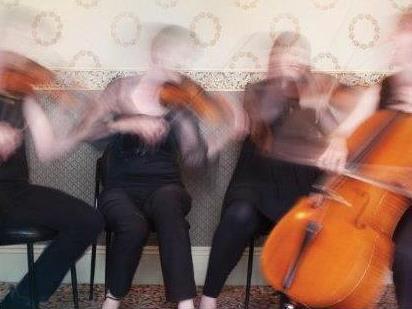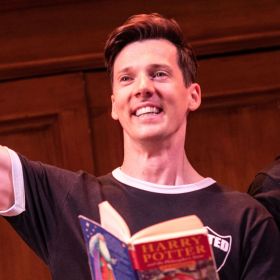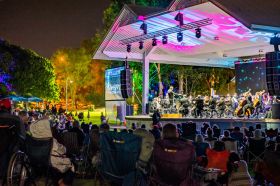For its concert at the Melbourne Recital Centre, the Flinders Quartet – including guest violinist Shaun Lee-Chen – walked out onto the stage and almost immediately began playing.
The first work listed in the program was by Elena Kats-Chernin and, indeed, the work we heard clearly had the ‘folk’ themes that informed this concert. However, this was not Kats-Chernin’s new work, it was Bartok – but not the Bartok Rumanian Folk Dances we were to hear later. Confused? Let’s begin again.
Flinders Quartet chose to begin its concert, Folk Memories, with a bonus: later announced as Bartok Duos, but clearly involving all players. The music served both to establish the credentials of the players – not that these were ever in doubt – and to set the scene for an evening of what is generally recognised as folk or peasant-inspired music. (It was illuminating to read the Quartet’s own program notes which quoted authority Gabor Takacs-Nagy speaking of peasants, rather than Gypsy fiddlers, ‘grasping the bow in a fist after a hard day in the fields and enjoying the day’s work through playing music’).
This sense of music having a real connection with people’s lives was most relevant to Kats-Chernin’s Joyce’s Mob. ‘Joyce’ was Joyce Evans who, for the second time, had asked the composer for a work based on her own ‘mob’. Evans was in the audience, and like cellist Zoe Knighton, spoke (to applause) of the contribution of ‘boat people’ of earlier times, who brought their families, traditions and music with them. The message for our times was clear – but this was not a night for politics, it was an occasion to appreciate fine music.
For its part, Flinders Quartet played Joyce’s Mob with great understanding for the ‘characters’ and events Kats-Chernin created. There was a lot of movement and contrasts in the work and, as expected, influences from the composer’s background. So it was interesting that the third movement was based on ‘a Polish melody that Joyce’s mother used to sing to her’, according to Kats-Chernin.
The theme was almost hypnotic in its repetition, but also had a sweetness well conveyed by the Quartet. In this, and the lilting dance-like sound of the movement, the players demonstrated the synchronicity they are famous for – with Lee-Chen an easy fit. Although the Quartet as a whole thrilled in the restless, rapid final movement, Lee-Chen had the opportunity to show his prowess as a soloist.
First violin up to this point, Helen Ayres, gracefully allowed the guest to take over the lead role in the Bartok Rumanian Folk Dances. Lee-Chen obliged with beautiful playing from the opening Stick Dance, while integrating easily with the other three musicians. While the second, Sash Dance, gave the spirited melody to the violins, it also showed that four musicians of exceptional quality can nevertheless blend well to produce a captivating sound.
The complexity of the final movement – the rapid tempo being just one challenge – required technical brilliance combined with harmonic sweetness. The Quartet triumphed in this, as it did in the Beethoven – the one work that was consciously written for musicians of such calibre.
Ironically, its more elitist perspective made this the odd one out in this program although I accept that this view could be contested. And, in terms of performance, there was no disappointment. It is hardly surprising that the Flinders Quartet played the work with consummate ease.
What made this more extraordinary was that one of the violinists was a guest, yet fitted so well. Anyone who saw Flinders Quartet’s imaginative collaboration with Red Stitch in last year’s play, Behind Closed Doors, would understand what I mean.
But perhaps the lesson the Quartet took away from Adam Cass’s play was that you need to be very, very careful about inviting an ‘outsider’ into your group. On this occasion, the Quartet chose very well!
Rating: 4 stars out of 5
Folk Memories
Flinders Quartet
Violinists: Helen Ayres and Shaun Lee-Chen
Viola: Helen Ireland
Cello: Zoe Knighton
Program:
Bartok Rumanian Folk Dances
Elena Kats-Chernin Joyce’s Mob
(World premiere commissioned by Flinders Quartet with support from Joyce Evans)
Beethoven String Quartet No. 7 in F major, Op. 59, No. 1
Melbourne Recital Centre
28 August





